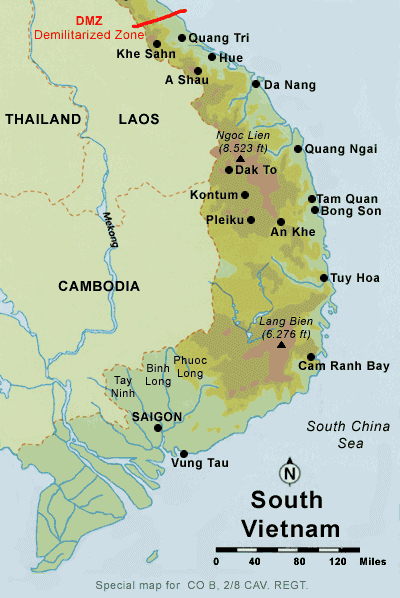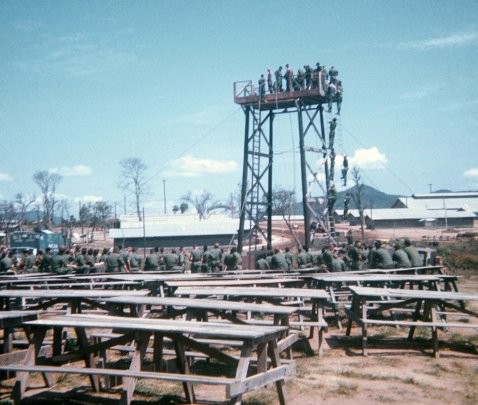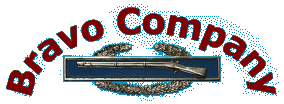| |

Thanks to Sven Gerlith |
|
Most of us entered Vietnam at Cam Ranh Bay,
a large US Air Force and Navy base and US Army processing center for personnel
assigned to units in the northern military regions.
BARRACKS AT CAM RANH BAY

|
C-130
HERCULES AT CAM RANH BAY
 |
Thanks to Ray
Bono for above two photos.
Here we spent 2-3 days in-processing and then we were transported by
aircraft, usually a C-130 Hercules, to Camp Radcliff, located at An Khe, the
original division base camp established by the 1st Cavalry Division in the
central highlands during the autumn of 1965.
CAMP
RADCLIFF AND
HON KONG MOUNTAIN AT AN KHE

Thanks to Sam Walker |
GOLF COURSE AT CAMP RADCLIFF

Thanks to Casper Platoon
|
Until January 1968, the majority of the division was deployed near the town
of Bong Son on the coast. Therefore, Camp Radcliff served as the division
rear area camp and the 2nd Battalion, 8th Cavalry Regiment had its own
storage facilities for our duffel bags containing uniforms and other
personal possessions. We spent several days at Camp Radcliff attending the
First Team Academy, appropriately nicknamed the “Cherry School”, which was a
mandatory course for all troopers assigned to the 1st Cavalry Division. Here
we received instruction on a variety of practical subjects, such as,
guerrilla warfare, combat air assault tactics, patrolling, radio procedures,
rappelling, and the division policy on malaria control – white pill daily,
orange pill weekly, and button-up/sleeves rolled down between sunset and
sunrise.
RAPPELLING TRAINING AT CAMP RADCLIFF

Thanks to James Ford |
CAMP RADCLIFF
 |
We were also issued with the necessary
equipment required for out assignment; rucksack, poncho liner, poncho
blanket, jungle uniforms, steel helmet, pistol belt, first aid packs, water
canteens, insect repellent, water purification tablets, jungle boots, etc.
Most of this equipment was specially manufactured for jungle warfare in
Vietnam. For instance, inside the sole of the jungle boots was a stainless
steel plate to protect the wearer from punji stakes and the insoles had
special vent holes for draining moisture.
|
THE FAMOUS JUNGLE BOOTS |
Our time at Camp Radcliff also provided us with a few days to adjust to
the hot, humid tropical climate of Vietnam. There is heavy rainfall in
the northern provinces, around 120 inches on the coast, and the monsoon
season in our area of operation was from November to March. From An Khe,
we were transported to Landing Zone English, a large base camp for the
1st Brigade and our unit, the 2nd Battalion, 8th Cavalry Regiment. A US
Army plane called the Caribu was used for the
short hauls between An Khe and LZ English. |
CARIBU

Thanks to Tom
De Young |
Landing Zone (LZ) English was located close to a town called Bong Son, in
the Province of Binh Dinh. Here we met the Executive Officer of Bravo
Company, who was responsible for administration and logistics. It was here
where we were issued an M16 and with what was considered to be a basic load
of ammunition for a rifleman; a minimum of 500 rounds of M16 ammunition
loaded into 20 magazines, a minimum of 100 rounds in a bandoleer, 4
fragmentation grenades, and at least 1 smoke grenade, 1 trip flare, 1 hand
fired aerial parachute flare, 1 stick of C-4 and 1 claymore mine. We zeroed
our weapons at LZ English or at our field location.
|
TYPICAL LOAD FOR AN ASSISTANT
M-60 MACHINE GUNNER
 |
From LZ English we were
transported to the field location of Bravo Company late in the afternoon on
one of the many supply helicopters used for the “ash and trash” run.
BRAVO COMPANY NIGHT DEFENSE
POSITION BONG SON

Thanks to Sam
Walker |
ASH AND TRASH HUEY

Thanks to Bill Cracchiola |
On arrival we met the Company Commander and 1st Sergeant who assigned each
of us to a platoon. Then we met our Platoon Leader, Platoon Sergeant and
finally our Squad Leader. It was here at the squad level where we received
intensive “on the job training” and under the close supervision of all the
other members of the squad. This was a dangerous place and new arrivals had
a lot to learn. Of course our trainers had all been through the same course,
so they handled us professionally and welcomed us as a member of the team.
At least one trooper remembers with gratitude the detailed guidance that he
received from one of these old- timers whose photo appears below:
CLIFFORD WRIGHT
 We quickly learned that the Bong Son coastal plain was our homestead and
according to the old-timers, our unit might deploy on combat missions to
other regions but we always returned to our base at Bong Son. These
old-timers knew the Bong Son plain and became our guides on the do's and
don'ts. For example, they knew that if we established our night defensive
position in the vicinity of a particular Vietnamese graveyard north of LZ
English, which we often did, a nasty Vietcong (VC) with one of our M-79
rocket launchers would always lob a couple of grenades at us as a sort of
good night greeting. He was always at least 100 meters short of his target
and we always failed in our many attempts to ambush him. However, we did get
one of his colleagues in an ambush when we had the mission of securing a
section of LZ English. This guy worked in the battalion barbershop during
the day and was an active VC guerrilla at night until his luck ran out when
he triggered the claymore mines of our ambush.
We quickly learned that the Bong Son coastal plain was our homestead and
according to the old-timers, our unit might deploy on combat missions to
other regions but we always returned to our base at Bong Son. These
old-timers knew the Bong Son plain and became our guides on the do's and
don'ts. For example, they knew that if we established our night defensive
position in the vicinity of a particular Vietnamese graveyard north of LZ
English, which we often did, a nasty Vietcong (VC) with one of our M-79
rocket launchers would always lob a couple of grenades at us as a sort of
good night greeting. He was always at least 100 meters short of his target
and we always failed in our many attempts to ambush him. However, we did get
one of his colleagues in an ambush when we had the mission of securing a
section of LZ English. This guy worked in the battalion barbershop during
the day and was an active VC guerrilla at night until his luck ran out when
he triggered the claymore mines of our ambush.
BONG SON
The nature of the war changed dramatically with the January 1968 Tet
Offensive, and the massive NVA attacks throughout Vietnam. In response to
these attacks, the 1st Cavalry Division was sent to the northern provinces
to combat NVA units at Hue, Quang Tri, Khe Sanh and in the A Shau Valley. We
left our homestead in the Bong Son Plains and we never returned. The 1st
Cavalry Division established a new base at Camp Eagle, at Hue - Phu Bai,
while the 1st Brigade and our battalion established a new base at Camp
Evans, located west of Quang Tri. After our deployment to Quang Tri, the 1st
Cavalry Division “Cherry School” remained operational at Camp Radcliff.
After completing this course, new arrivals were transported by C-130
Hercules from Camp Radcliff to Camp Evans.
|





 We quickly learned that the Bong Son coastal plain was our homestead and
according to the old-timers, our unit might deploy on combat missions to
other regions but we always returned to our base at Bong Son. These
old-timers knew the Bong Son plain and became our guides on the do's and
don'ts. For example, they knew that if we established our night defensive
position in the vicinity of a particular Vietnamese graveyard north of LZ
English, which we often did, a nasty Vietcong (VC) with one of our M-79
rocket launchers would always lob a couple of grenades at us as a sort of
good night greeting. He was always at least 100 meters short of his target
and we always failed in our many attempts to ambush him. However, we did get
one of his colleagues in an ambush when we had the mission of securing a
section of LZ English. This guy worked in the battalion barbershop during
the day and was an active VC guerrilla at night until his luck ran out when
he triggered the claymore mines of our ambush.
We quickly learned that the Bong Son coastal plain was our homestead and
according to the old-timers, our unit might deploy on combat missions to
other regions but we always returned to our base at Bong Son. These
old-timers knew the Bong Son plain and became our guides on the do's and
don'ts. For example, they knew that if we established our night defensive
position in the vicinity of a particular Vietnamese graveyard north of LZ
English, which we often did, a nasty Vietcong (VC) with one of our M-79
rocket launchers would always lob a couple of grenades at us as a sort of
good night greeting. He was always at least 100 meters short of his target
and we always failed in our many attempts to ambush him. However, we did get
one of his colleagues in an ambush when we had the mission of securing a
section of LZ English. This guy worked in the battalion barbershop during
the day and was an active VC guerrilla at night until his luck ran out when
he triggered the claymore mines of our ambush.